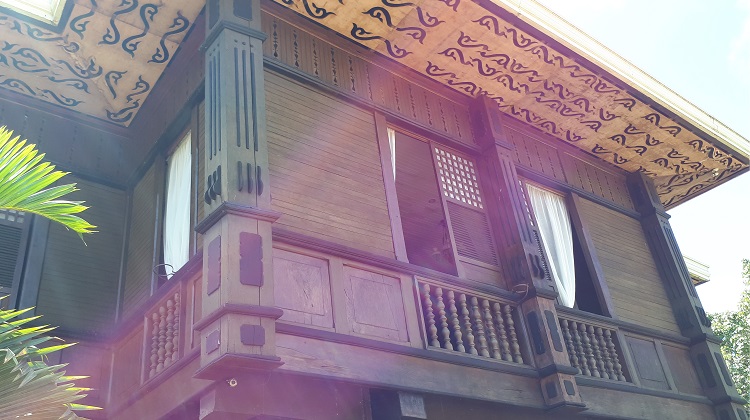The Noli begins and unfolds expeditiously. The first five chapters already present most of its main characters and hints at overarching conflicts and motives.

Chapter 1: A Social Gathering
Wealthy Binondo resident, Don Santiago de los Santos (Capitan Tiago), throws a last minute dinner party. Among the many guests are the Dominican curate of Binondo, Fray Sibyla; the former curate of San Diego, Fransiscan Fray Damaso; an elderly lieutenant; and two civilians, Senor Laruja and a rubicund youth who has recently arrived in the country.
Damaso and Laruja impress upon the rubicund youth the quality of indolence of the native population, but the conversation diverges as Sibyla asks Damaso about his tenure in San Diego. In response, The Fransiscan launches into a seemingly inexplicable tirade against the Captain-General, to which the elderly lieutenant takes offense. He reveals that Damaso’s anger stems from his having been transferred by the Captain-General to a new town as punishment for having had the corpse of a man falsely accused of suicide dug up.
As the mutual annoyance between the friar and lieutenant abates, two other guests join the group, the lame Spaniard Doctor De Espedaña, and his ostentatious European styled Filipina wife, Doña Victorina.
Chapter 2: Crisostomo Ibarra
Capitan Tiago arrives at his house leading by the hand a young man dressed in deep mourning whom he has gone out to meet. He introduces the man as Don Crisostomo Ibarra, the son of his departed friend, Don Rafael Ibarra. The guests react with visible surprise. Ibarra moves to greet Damaso with joy as the curate of his town and his father’s friend, but the Fransiscan publicly rebuffs him and denies the suggested friendship. The lieutenant, on the other hand, greets Ibarra warmly and declares the elder Ibarra an honorable man.
As the guests disperse around the house, Ibarra, who had been away in Europe for 7 years, is left to reacquaint himself with the ladies and gentlemen of his country. Ibarra meets the friendly Capitan Tinong who invites him to dine with him at a later date.
Chapter 3: Dinner
As the guests gather around Tiago’s dinner feast which is really a thanksgiving for Ibarra’s safe arrival, Sibyla and Damaso argue over the seat at the head of the table, insincerely offering each other the place of honor. Later, Damaso’s mood is made more foul when he is served the worst parts of the chicken from the tinola,[1] while Ibarra is given the choicest parts.
During the dinner, Laruja asks Ibarra what he found most notable in his travels. Ibarra shares his insights, which Damaso declares worthless, and Ibarra’s European sojourn a waste of fortune. Ibarra restrains himself from giving a biting response and merely tells the tense guests that Damaso’s familiar treatment of him is owing to the friar’s having frequently enjoyed his father’s table and hospitality. Ibarra toasts Spain and the Philippines and excuses himself, deciding not to wait for Maria Clara who Tiago says is on her way.
Chapter 4: Heretic and Filibuster
Ibarra walks abstractedly through the streets. While he marvels at how little has changed from the Binondo of his youth, he encounters Lieutenant Guevarra, the same old gentleman from Tiago’s dinner. As they walk, Ibarra questions the lieutenant about the details of his father’s death, having heard nothing about it. Guevarra reveals that Don Rafael died in prison after having been arrested for the death of a Spanish collector whom he confronted for beating a schoolboy. A physician later ascribed the collector’s death to congestion,[2] but Don Rafael’s enemies, jealous of his wealth, falsely accused him of other crimes including being a heretic and filibuster,[3] thereby prolonging his case and time in detention.
Guevarra also shares that even before Don Rafael’s arrest, and only a few months after Crisostomo’s departure from Europe, Padre Damaso had already become inexplicably hostile towards Don Rafael, even denouncing him from the pulpit.
Chapter 5: A Star in the Dark Night
Ibarra sits in a hotel room fronting the river, across which is visible Capitan Tiago’s house still brightly illuminated. If Ibarra hadn’t been preoccupied with his thoughts, he would have seen a beautiful maiden surrounded by admirers including Padres Damaso and Sibyla. A young, pale, thin Fransiscan stands apart, looking at the maiden from a distance.
Ibarra instead imagines his father in a filthy cell, in the final throes of death as he calls his son’s name. Ibarra sees himself far away, enjoying wine, a feast, and the company of merry companions. Ibarra dwells long on his sad thoughts but eventually succumbs to sleep.
Only the pale Fransiscan remains awake through the dawn.
Notes:
1. Tinola is a Filipino soup containing a mix of chicken and vegetables and may include green papaya or chayote, moringa leaves, ginger, onions, and pechay. Chicken may sometimes be substituted with fish or pork.
3. The original Spanish text writes this as “congestión”, but there seems to be a slight difference among the translations. Derbyshire translates this as “hemorrhage”; Guerrero “apoplexy”; Augenbraum “a blockage”; and Locsin “congestion”. Read here the list of translated book versions used as reference for these chapter summaries.
4. The Spanish text uses the term “filibustero”, which is also what Almario uses in his Filipino translation. Derbyshire uses the term “filibuster”. The rest of the translations used for the summaries translate this as “subversive”. See the list of translated books used here.
Can you please put moral lesson per chapter:)